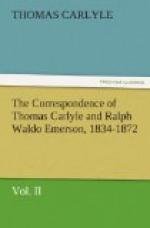Dear Carlyle,—Is it too late to send a letter to your door to claim an old right to enter, and to scatter all your convictions that I had passed under the earth? You had not to learn what a sluggish pen mine is. Of course, the sluggishness grows on me, and even such a trumpet at my gate as a letter from you heralding-in noble books, whilst it gives me joy, cannot heal the paralysis. Yet your letter deeply interested me, with the account of your rest so well earned. You had fought your great battle, and might roll in the grass, or ride your pony, or shout to the Cumberland or Scotland echoes, with largest leave of men and gods. My lethargies have not dulled my delight in good books. I read these in the bright days of our new peace, which added a lustre to every genial work. Now first we had a right to read, for the very bookworms were driven out of doors whilst the war lasted. I found in the book no trace of age, which your letter so impressively claimed. In the book, the hand does not shake, the mind is ubiquitous. The treatment is so spontaneous, self-respecting, defiant,—liberties with your hero as if he were your client, or your son, and you were proud of him, and yet can check and chide him, and even put him in the corner when he is not a good boy, freedoms with kings, and reputations, and nations, yes, and with principles too,—that each reader, I suppose, feels complimented by the confidences with which he is honored by this free-tongued, masterful Hermes.—Who knows what the [Greek] will say next? This humor of telling the story in a gale,—bantering, scoffing, at the hero, at the enemy, at the learned reporters,—is a perpetual flattery to the admiring student,—the author abusing the whole world as mad dunces,—all but you and I, reader! Ellery Channing borrowed my Volumes V. and VI., worked slowly through them,—midway came to me for Volumes I., II., III., IV., which he had long already read, and at last returned all with this word, “If you write to Mr. Carlyle, you may say to him, that I have read these books, and they have made it impossible for me to read any other books but his.”
’T is a good proof of their penetrative force, the influence on the new Stirling, who writes “The Secret of Hegel.” He is quite as much a student of Carlyle to learn treatment, as of Hegel for his matter, and plays the same game on his essence-dividing German, which he has learned of you on Friedrich. I have read a good deal in this book of Stirling’s, and have not done with it.
One or two errata I noticed in the last volumes of Friedrich, though the books are now lent, and I cannot indicate the pages. Fort Pulaski, which is near Savannah, is set down as near Charleston. Charleston, South Carolina, your printer has twice called Charlestown, which is the name of the town in Massachusetts in which Bunker Hill stands.—Bancroft told me that the letters of Montcalm are spurious. We always write and say Ticonderoga.




